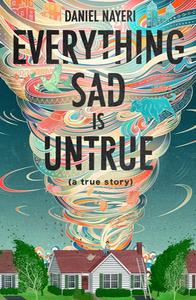
|
|
| Daniel Nayeri | |
Daniel Nayeri was born in Iran and spent several years as a refugee before immigrating to Oklahoma at age eight with his family. He is an author, and the publisher of Odd Dot, an imprint of Macmillan. He lives with his wife and son in Jersey City, N.J.
Please tell me about this book. The title, Everything Sad Is Untrue: (a true story), is quite remarkable. Is this biography?
It's entirely biographical. In fact, the first version I wrote was a nonfiction essay for adults. But it didn't work. The heart of the story was from the perspective of a pre-teen. So, I chose to create that narrator. I changed some names, and I invented dialogue. But otherwise, I think of it as a memoir.
It's the story of how my mother converted to Christianity, how we became refugees when she was caught by the Iranian secret police and how we ended up in Oklahoma.
Khosrou (known to his neighbor Oklahomans as Daniel) has a distinct voice. How did you find this voice?
The narrator is me, and so he bears many of the flaws of my character. He thinks he knows what's what, when the reader can tell otherwise. He begs when he hates to beg. He wants a friend but doesn't know how to be one. I think all these qualities are inherently funny in a pre-teen, standing in front of a mirror, flexing his arms at the world. He really and truly thinks he's strong enough to tell this story without weeping. I guess it's not funny ha-ha, but that's the sense of humor.
 Tell me about the format of the book. What made you want to fashion a protagonist after Scheherazade?
Tell me about the format of the book. What made you want to fashion a protagonist after Scheherazade?
Khosrou tells these stories--his family history, Persian folklore and the history of the country--to a fundamentally skeptical audience of classmates. This is the dynamic of Scheherazade in the One Thousand and One Nights, telling stories to the king. If she fails, she dies. If he fails, he dies the way kids die in middle school. He's hated and given wedgies until kingdom come. Eternal stakes for everybody.
In your dedication you say, "I didn't know that life would make a liar out of me" and the first sentence of the book is "All Persians are liars and lying is a sin." How do you want readers to feel when they first start this book? How do you want them to feel when they finish?
At the beginning, I want them to love the narrator out of pity. By the end I want them to love him as a friend.
It is so easy to read that first line, "All Persians are liars, and lying is a sin," as a uniquely Persian problem. But that's not what the line says. It's referring to Epimenides, the philosopher, who would hold up a sign that said, "All Cretans are liars." The paradox is that Epimenides was himself a Cretan.
The book is immediately asking the reader not to lie to themselves. Not to dare believe they are any better. Not to omit themselves from the guilt. And from there it sets out to convince the reader that strictly speaking, all our memories are lies we tell ourselves.

